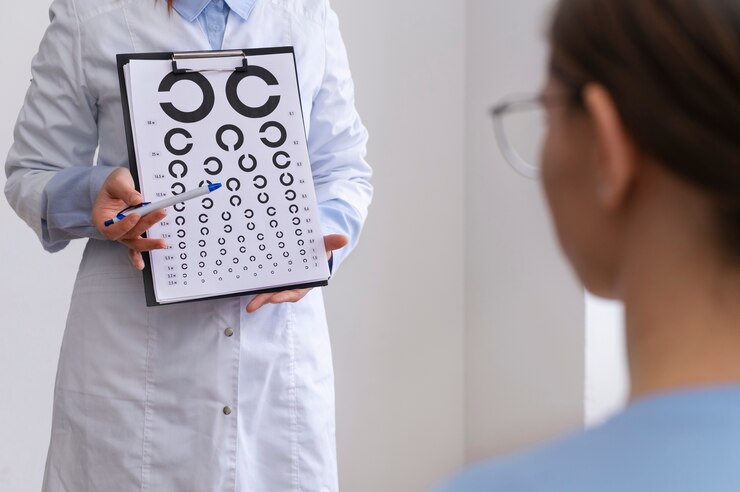The Importance of Regular Eye Exams
June 20, 2024
Have Any Questions?
Please contact us, if you have any queries
Categories

The eyes are one of the most vital organs in the human body, playing a crucial role in our daily lives and overall well-being. Vision is often considered the most dominant of the senses, providing us with the ability to perceive and interpret the world around us. The importance of eyes can be understood through various facets of human experience, including health, safety, communication, and quality of life. The eyes are indispensable to human life, affecting nearly every aspect of our existence. Protecting our vision through regular eye check-ups, proper nutrition, and eye safety practices is essential for maintaining the richness and fullness of life that our eyes provide.
Health and Safety:
Our eyes serve as primary tools for navigating our environment safely. They help us detect hazards, recognize faces, and interpret signs, all of which are essential for avoiding accidents and staying safe. Good vision is critical for tasks that require precision and coordination, such as driving, reading, and operating machinery. Without a clear vision, these activities become challenging and potentially dangerous.
Communication:
Eyes are fundamental in non-verbal communication, allowing us to express and perceive emotions. Eye contact can convey confidence, interest, and understanding, playing a significant role in social interactions. Through our eyes, we can read the emotional states of others, fostering empathy and deeper connections.
Quality of Life:
The ability to see and appreciate the beauty of the world significantly enhances our quality of life. From enjoying a colorful sunset to appreciating art, vision enriches our experiences and adds depth to our perceptions. Visual stimuli are crucial for learning and cognitive development, especially in children, where visual aids are often used in education to facilitate better understanding.
Mental and Emotional Well-being:
Vision impairment can lead to social isolation and decreased independence, impacting mental health. People with good vision are more likely to engage in social activities and lead active lifestyles, contributing to their overall happiness and well-being.
Medical Insight:
Eyes can also be indicators of general health. Conditions like diabetes, hypertension, and even certain neurological disorders can manifest in the eyes, allowing for early diagnosis and treatment. Regular eye examinations can thus be pivotal in maintaining not just ocular health but overall health.
THE IMPORTANCE OF REGULAR EYE EXAMS
Regular eye exams are a critical component of maintaining overall health and well-being. Eyes are not only the windows to the world but also windows to our general health. Regular eye check-ups can detect eye problems at their earliest stages, when they are most treatable, and can also uncover other health issues.
Early Detection of Eye Diseases
One of the primary reasons for regular eye exams is the early detection of eye diseases. Many serious eye conditions, such as glaucoma, macular degeneration, and diabetic retinopathy, often develop without noticeable symptoms in the early stages. By the time symptoms become apparent, significant, irreversible damage may have already occurred. Regular eye exams can identify these diseases early, allowing for timely intervention that can prevent or minimize vision loss.
Monitoring Vision Changes
Vision changes can occur gradually and might go unnoticed until they significantly impact daily activities. Regular eye exams can detect subtle changes in vision that you might not be aware of. For example, changes in refractive errors such as myopia (near sightedness), hyperopia (far sightedness), and astigmatism can be easily corrected with updated prescriptions for glasses or contact lenses. Keeping your prescription current ensures that you can see as clearly and comfortably as possible.
Identifying General Health Issues
The eyes can reveal a lot about overall health. Conditions such as diabetes, hypertension, high cholesterol, and even certain cancers can manifest in the eyes. Through a comprehensive eye exam, an optometrist or ophthalmologist can spot signs of these systemic diseases and refer you to appropriate healthcare professionals for further evaluation and treatment. For instance, diabetic retinopathy is a common complication of diabetes that can be detected through an eye exam, often before the patient is aware of their diabetic condition.
Children’s Eye Health
Regular eye exams are particularly important for children. Vision is essential for a child’s development and learning. Undetected vision problems can lead to difficulties in school and can impact a child’s ability to reach developmental milestones. Early eye exams can catch issues such as amblyopia (lazy eye), strabismus (crossed eyes), and other refractive errors, ensuring that children have the visual skills they need to succeed academically and socially.
Age-Related Eye Conditions
As we grow older, the likelihood of developing eye conditions such as cataracts, glaucoma, and macular degeneration rises. Regular eye exams become increasingly important for older adults to monitor for these conditions. Early detection and management can help preserve vision and maintain quality of life.
Eye Safety and Preventive Care
Regular eye exams also provide an opportunity to discuss eye safety and preventive care. Eye care professionals can offer advice on protecting your eyes from injury, reducing eyestrain, and maintaining eye health through proper nutrition and lifestyle choices. For instance, they can recommend wearing protective eyewear during certain activities or using appropriate lighting and ergonomic setups to minimize eyestrain.
Conclusion
Regular eye exams are essential for maintaining good vision and overall health. They enable the early detection and treatment of eye diseases, monitor vision changes, and can uncover systemic health issues. For children, they are vital in ensuring proper visual development, and for older adults, they help manage age-related eye conditions. Additionally, regular exams offer a chance to receive valuable advice on eye safety and preventive care. Prioritizing kids is a simple yet powerful way to protect one of your most important senses and maintain your overall well-being.
If you are considering an eye check-up for yourself or for your loved ones, consult a professional eye specialist only. Once you have decided to proceed, schedule an initial consultation
